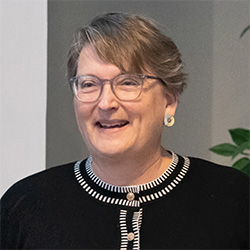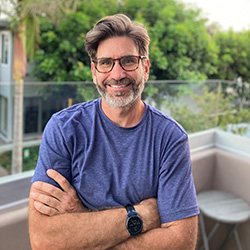Young women and men with disabilities face unique barriers in the transition from school to adulthood. In recognition of the IES 20th anniversary, we are spotlighting Paths 2 the Future, a career development intervention for students with disabilities with gender-specific versions for boys and girls. For this blog post, virtual intern Audrey Im checks in with IES grantees Dr. Lauren Lindstrom (University of California, Davis) and Dr. John Lind (University of Oregon) about their experiences iteratively developing Paths 2 the Future. What started as an intervention to provide career guidance to high school girls with disabilities has now expanded to a package of interventions that also address the needs of high school-aged men with disabilities and underserved students of all genders.

In 2007, Lauren Lindstrom (then a senior research associate at the University of Oregon) received a grant from the National Center for Special Education Research (NCSER) to develop PATHS, a curriculum to improve education and career outcomes of high school girls with learning disabilities, ADD/ADHD, and emotional or behavioral disabilities. Lindstrom and her team created a curriculum advancing gender equity, disability awareness, and career readiness, which was then implemented in six high schools as an 18-week program.
According to Dr. Lindstrom, her team created PATHS just for girls after examining the disparate post-school outcomes for high school girls with disabilities enrolled in existing transition programs. “I consistently noticed that the girls were less likely to go to work, and if they went to work, they were working in really low-wage jobs,” she said. “And this was with the benefit of an intervention, right? Same kind of disabilities, same schools, but very different outcomes. So that really sparked my interest.”
In 2015, Dr. Lindstrom received a second grant to conduct a randomized controlled trial to test whether the intervention, now called Paths 2 the Future (P2F), improved career knowledge and skills among participants.
“We realized that this was probably one of the very first randomized controlled trials of a gender-specific career intervention,” Lindstrom said.
Lindstrom and her team sampled 366 girls with high-incidence disabilities in 26 Oregon high schools. The girls randomly assigned to the P2F intervention received the curriculum’s four core modules on self-awareness, disability knowledge, gender identity, and career and college readiness. They also received extensive information on career-related activities. The girls in the control group received the existing transition services of their respective schools. This study period lasted one 18-week semester and included a 6-month follow up with the students.
The P2F study found that the girls in the treatment group not only had more awareness of their identity and career possibilities after completing the curriculum, but they also had more confidence to talk about those topics. “The nature of being in a girl-only class really mattered,” Lindstrom said. “The students told us they felt safe there. They said things like ‘I’m a different person now. I feel empowered to talk, to think differently about my future.’” Lindstrom’s study also found that students in the treatment group were more likely to seek and have work experience in high school, an important observation as early work experience has proven to be a predictor for their future employment.

Lindstrom’s co-PI and research collaborator, Dr. John Lind, wondered if the P2F model would also work for boys. Lind, a research associate at the University of Oregon, received a 2019 IES grant Paths to the Future for Young Men (P2F-Young Men) to modify the P2F curriculum to take into account the specific needs of high school boys with high-incidence disabilities. These needs included (but were not limited to) building healthy relationships, breaking down gender stereotypes, and managing anger and stress.
“I think these needs are applicable to a range of genders but doing it in a classroom with just young men opens up the opportunity for potentially deeper discussions,” Lind said. “And that’s feedback that we’ve gotten anecdotally from the teachers we work with.”
After fully developing the P2F-Young Men curriculum, the researchers are currently conducting a small randomized controlled trial with eight teachers and their students at Oregon high schools. Although they are still in the process of collecting data for this study, Lind noted that teachers report that having a gender-specific curriculum helped the boys feel more comfortable in having discussions. “This is anecdotal at this point,” Lind acknowledged, “but if that stands true by the end of our study, I think that’s a really important finding.”
To Lindstrom and Lind, having separate curriculum interventions for different genders was necessary to address gender-specific issues and foster a safe learning environment. At the same time, they felt that it was important for all students across the gender spectrum to have access to these curricula to promote social-emotional development and build knowledge of career pathways.
“Teachers and schools have come to us and said, well is it just for cisgender students or people who are born as a certain gender? And our answer to that is no,” Lind affirmed. “What we’ve done with P2F-Young Men is create a transition curriculum for people who identify as young men. We start early in the curriculum of getting to know yourself, exploring yourself, your strength.”
In 2017, through funding from the National Center for Education Research (NCER), Lindstrom and Lind also developed a non-gender-specific version of the curriculum called P2F for All. This curriculum was targeted to underserved youth who face barriers to educational attainment and, due to a variety of reasons, may not be receiving transition services or college and career readiness support. Their study developed and tested the new P2F for All curriculum and found that it increased participating students’ career readiness, emotional coping skills, and interpersonal skills.
P2F for All aimed to take the findings from their gender-specific studies focused on the needs of students with disabilities and create a new, comprehensive career readiness curriculum—one that succeeded at addressing the needs of underserved students, not just those identified for special education services, regardless of gender. “What we strive to do in special education is provide services that are individualized and meet the needs of the person,” Lind said. “I think we’ve got a range of lessons to address that, and, ultimately, I think that lessons could be pulled out of a menu to meet specific needs for all students.”
Lauren Lindstrom is a professor and dean of the School of Education at the University of California, Davis. Prior to UC-Davis, Dr. Lindstrom served more than 25 years as an academic and administrator at the University of Oregon’s College of Education. Dean Lindstrom is an active researcher whose areas of interest include inclusive education, gender equity, career and college readiness and transition services for youth with disabilities.
John Lind is a research associate at the University of Oregon’s College of Education. As a former special education teacher, Dr. Lind has extensive experience developing and implementing strength-based interventions for youth with disabilities, including adolescents with emotional and behavior disabilities. He has also worked as an educational consultant, providing training and technical assistance to international, national, and state departments of education on issues related to IDEA, effective classroom management, multi-tiered levels of support, and inclusion. Currently, he is the director of the SIGnetwork, a clearinghouse of resources for the OSEP-funded State Personnel Development Grantees.
This blog was written by Virtual Student Federal Service Intern Audrey Im and produced by Katina Stapleton (Katina.Stapleton@ed.gov). Akilah Nelson (Akilah.Nelson@ed.gov) is the program officer for the IES Transition to Postsecondary Education, Career, and/or Independent Living portfolio. The blog is part of a larger series on DEIA in Education Research.